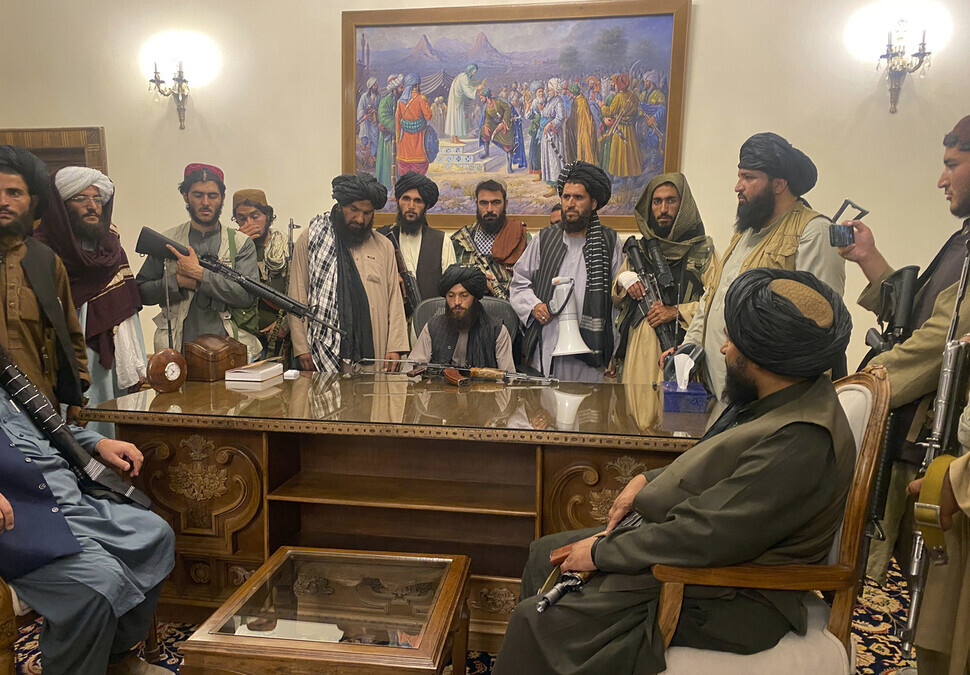hankyoreh
Links to other country sites 다른 나라 사이트 링크
[Editorial] What US defeat in Afghanistan teaches us

The Taliban, a group of armed insurgents in Afghanistan, declared the civil war over after its capture of the presidential palace in the capital of Kabul on Sunday. That concludes the war that began 20 years ago, when the US military invaded in October 2001, shortly after the 9/11 terrorist attacks.
Now the Taliban are on the verge of returning to power in Afghanistan after twenty years in the wilderness. There are lessons the international community needs to learn about why the US was defeated in Afghanistan after consuming so much blood and treasure.
Republican members of Congress harshly criticized US President Joe Biden for the defeat, comparing it to scenes of Americans riding helicopters out of Saigon — now known as Ho Chi Minh City — after the defeat of South Vietnam in the Vietnam War in 1975.
But the press has been more critical of Biden for inadequate preparations and miscalculations about the situation in Afghanistan following American withdrawal than about his decision to pull out the troops. Americans aren’t fond of the US involvement in Afghanistan; polls show that more than 70% of Americans support the troop pullout.
The Afghanistan situation encapsulates the weakness and unilateralism of the “war on terror” that the US began after 9/11. The US invaded Afghanistan to bring down the Taliban for sheltering Al Qaeda, the terrorist group behind the 9/11 attacks.
The Taliban was driven from Kabul two months after the war began, but the US didn’t stop there. The US believed it was necessary to turn Afghanistan into a “normal country” to extirpate the terrorists lurking there completely. But from the perspective of Afghans, the US was unilaterally attempting to foist a Western-style democratic state upon them.
The US paid no heed to concerns that “nation-building” would be impossible in Afghanistan, in light of its history and the complex web of religions and tribes of which it’s composed. The consequence of that is the Taliban’s return to power after twenty years and the chaos that’s engulfing Kabul at this very moment.
That was also why Iraq — like Afghanistan, a target of the war on terror — had to go through similar chaos for so long.
Given the Taliban’s repressive attitude toward the rights of women and minority groups and its extreme religious beliefs, there’s no telling whether the group can effectively lead Afghanistan. But attempts to impose specific ideologies and values from the outside are also very unlikely to succeed.
The situation in Afghanistan should remind the international community once again that, while universal values are important, it’s also important to allow the people of a country to decide their own destiny.
Please direct comments or questions to [english@hani.co.kr]

Editorial・opinion
![[Editorial] Penalties for airing allegations against Korea’s first lady endanger free press [Editorial] Penalties for airing allegations against Korea’s first lady endanger free press](https://flexible.img.hani.co.kr/flexible/normal/500/300/imgdb/original/2024/0502/1817146398095106.jpg) [Editorial] Penalties for airing allegations against Korea’s first lady endanger free press
[Editorial] Penalties for airing allegations against Korea’s first lady endanger free press![[Editorial] Yoon must halt procurement of SM-3 interceptor missiles [Editorial] Yoon must halt procurement of SM-3 interceptor missiles](https://flexible.img.hani.co.kr/flexible/normal/500/300/imgdb/child/2024/0501/17145495551605_1717145495195344.jpg) [Editorial] Yoon must halt procurement of SM-3 interceptor missiles
[Editorial] Yoon must halt procurement of SM-3 interceptor missiles- [Guest essay] Maybe Korea’s rapid population decline is an opportunity, not a crisis
- [Column] Can Yoon steer diplomacy with Russia, China back on track?
- [Column] Season 2 of special prosecutor probe may be coming to Korea soon
- [Column] Park Geun-hye déjà vu in Yoon Suk-yeol
- [Editorial] New weight of N. Korea’s nuclear threats makes dialogue all the more urgent
- [Guest essay] The real reason Korea’s new right wants to dub Rhee a founding father
- [Column] ‘Choson’: Is it time we start referring to N. Korea in its own terms?
- [Editorial] Japan’s rewriting of history with Korea has gone too far
Most viewed articles
- 160% of young Koreans see no need to have kids after marriage
- 2Presidential office warns of veto in response to opposition passing special counsel probe act
- 3Months and months of overdue wages are pushing migrant workers in Korea into debt
- 4[Editorial] Penalties for airing allegations against Korea’s first lady endanger free press
- 5Japan says it’s not pressuring Naver to sell Line, but Korean insiders say otherwise
- 630th anniversary Wednesday Demonstration pushed out of memorial site by far-right
- 7Dermatology, plastic surgery drove record medical tourism to Korea in 2023
- 8[Reporter’s notebook] In Min’s world, she’s the artist — and NewJeans is her art
- 9OECD upgrades Korea’s growth forecast from 2.2% to 2.6%
- 10Inside the law for a special counsel probe over a Korean Marine’s death